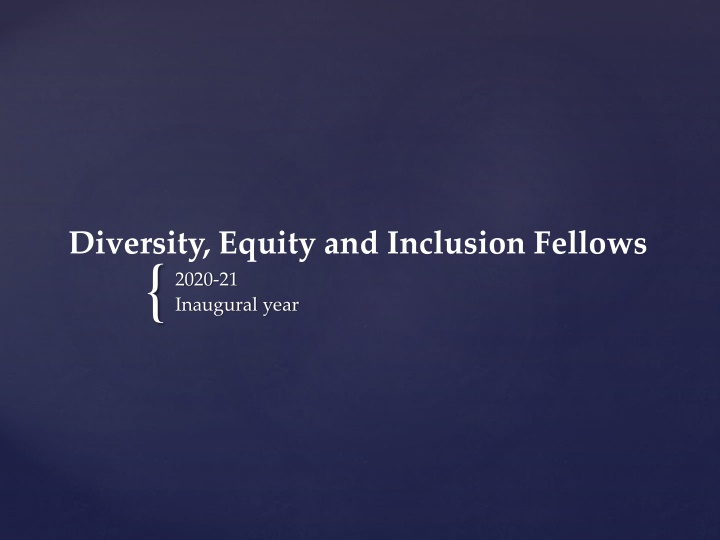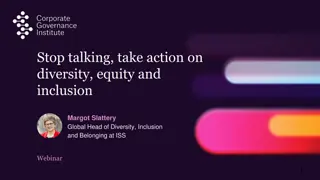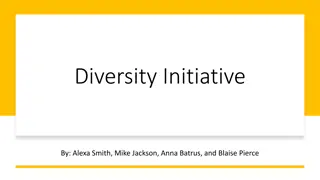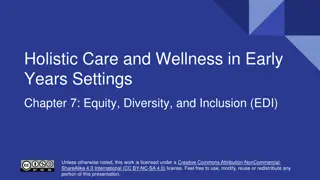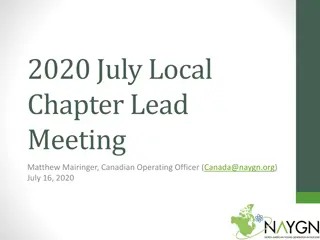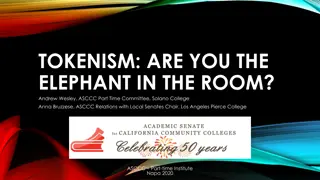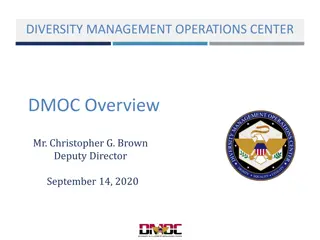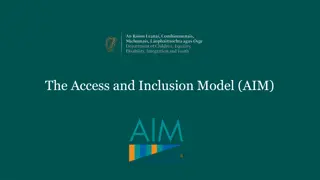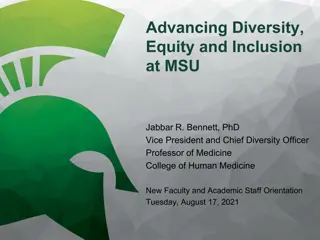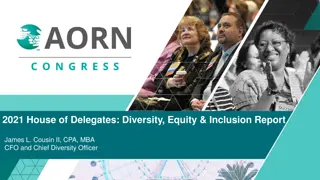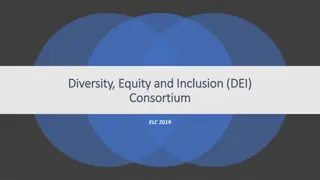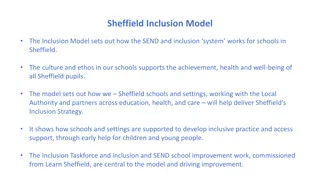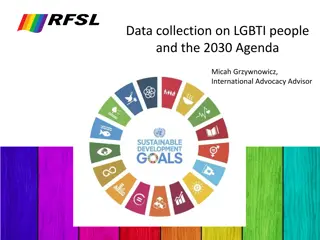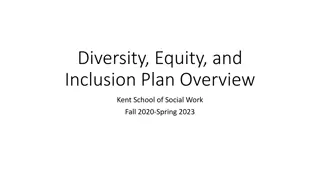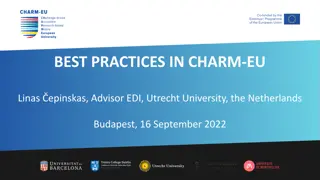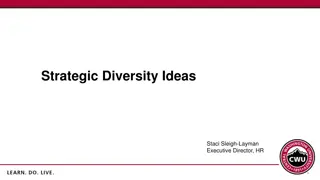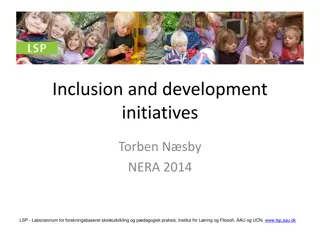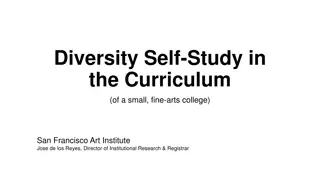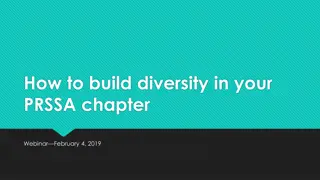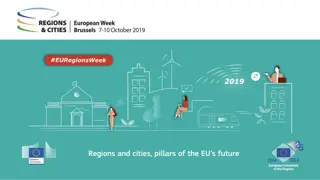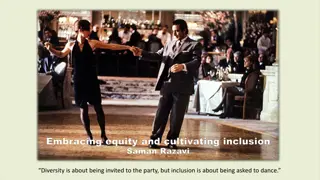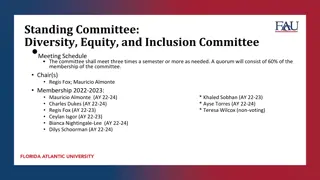Empowering Diversity and Inclusion Initiatives in Academic Settings
Empowering academic settings through diverse initiatives such as DEI fellows, Disability Studies Lecture, and revised curricula to enhance representation, dialogue, and learning experiences. Initiatives include faculty diversification, artist mentorship, and library guides on race. Progress also seen in art department committees, curriculum revisions, and community engagement efforts to promote equity and inclusion.
Download Presentation

Please find below an Image/Link to download the presentation.
The content on the website is provided AS IS for your information and personal use only. It may not be sold, licensed, or shared on other websites without obtaining consent from the author.If you encounter any issues during the download, it is possible that the publisher has removed the file from their server.
You are allowed to download the files provided on this website for personal or commercial use, subject to the condition that they are used lawfully. All files are the property of their respective owners.
The content on the website is provided AS IS for your information and personal use only. It may not be sold, licensed, or shared on other websites without obtaining consent from the author.
E N D
Presentation Transcript
Diversity, Equity and Inclusion Fellows 2020-21 Inaugural year {
April Coughlin Andrea Frank Kathy Goodell Jack L. Harris Shannon McManimon Lisa Mitten Nadia Sablin Erica Wagner Lori Ahava Wynters Joel Oppenheimer Nina Jecker-Byrne DEI Fellows 2020-1
Inauguration of yearly Disability Studies Lecture (first lecture: Prof. Simi Linton, a founder in the field, on 31stMarch 2021 95 attendees at 1pm on a Wednesday!!) Student panel on Disability Studies: April 19th 6-7.30pm (nearly 100 attendees) Working on development of Disability Studies Minor April Coughlin Department of Teaching and Learning
Established Art Department DEI committee which is working on a number of initiatives including diversifying student and faculty body, listening to student and alumni experiences, revising the Minor in Art, revising acceptance requirements, and others. Photography Program: revising our curriculum and working toward more adjunct diversity. Actively diversified artist examples and themes and writers discussed in class. In the Contemporary Issues course, assignments and class discussions focused on different dimensions of racism and social justice Alumni listening session for the Photography Program Brought 12 artists of color as guest speakers to the Photo program this school year and updated all our course lectures and readings to include at least 50% non-white and non-western artists and writers. Inauguration of the Eddy Project (International Mother Language Day, February 19thand Stuck : an FDC workshop thinking through being stuck). Andrea Frank and Nadia Sablin Department of Art
Revised curricula: course lectures and readings to include at least 50% non-white and non- western artists and writers. Painting and drawing area has added an adjunct faculty member of color. Working as a member of a gallery in NYC which works to represent works of art by artists of color and underrepresented communities. We also run a program called Deep Field where we mentor artists and at least half artists of color. Kathy Goodell Department of Art
Creation of a library guide on Race and the Global Promotional Industries Creation of Zotero library collection on Race and the Global Promotional Industries Jack L. Harris Department of Communication
Submitted revisions to the Humanistic/Multicultural Education master's program, further clarifying our centering in DEI approaches. This includes a programmatic name change, three new courses, and minor title and description revisions to multiple courses. Designed a new course, Antioppressive Pedagogies and Practices, that I am teaching for the first time this spring. It has been submitted for a permanent course number. The course is designed so that students critically interrogate and plan to change ways in which oppressions are enacted in their school and work settings, which include P12 education, higher education, and nonprofits/advocacy. Co-facilitated or participated on multiple DEI webinars and panels, including facilitating the virtual keynote (in lieu of the 26th annual Multicultural Education Conference) by Dr. Edwin Mayorga: "Praxis of Joy, Healing, and Transformation in the Midst of Dual Pandemics" (November 2020); panelist on "Becoming an Antiracist School of Education" (January 2021); and panelist on "Continuing the Conversation: Antiracism in the Classroom" (February 2021) Participant in weekly antioppressive education meetings, School of Education, fall 2020 Working to learn more about and integrate critical disability studies work and framings into my current course offerings. Shannon McManimon Department of Educational Studies & Leadership
Intentionally and successfully recruited and hired a diverse cohort of Sustainability Ambassadors. Of the 30 Sustainability Ambassadors in the fall of 2020, over half these students were Hispanic, Asian, Black and/or had multiple races/ethnicities. Three Sustainability Ambassadors self-identified in response to the gender identity question as non-binary or questioning. Launched an Intersectional Environmentalism team of Sustainability Ambassadors to examine the way that multiple identities intersect with the environmental movement. Now, all Sustainability Ambassadors teams intentionally integrate an intersectional approach into their work and examine the way their team's core mission impacts different sectors of society. For example, in the case study describing the Beyond Plastics team's efforts to reduce single-use plastics at SUNY New Paltz, we articulated the impacts that plastic production, consumption, and disposal have on low- income communities and communities of color across our country and the world through the lens of Global Goal #10: Reduce Inequalities. The Carbon Neutrality Team has also framed climate action policies and practices through an anti-racist lens, based on the writings of Ibram X Kendi's How to Be an Anti-Racist. Helped to broaden the sustainability frameworks introduced during the first event of the Sustainability Faculty Learning Community, to include perspectives from the environmental justice movement, indigenous rights movement, and Julian Agyeman's just sustainabilities framework. Lisa Mitten Office of Campus Sustainability
Creation of Capitol Riots Resource Guide for the library Work (with students) alongside Advocacy Housing Kingston (mental health housing). Erica Wagner Center for Student Engagement
Taught the course 'Relational Culture in the Era of Individualism', housed under the Sociology department where we examined what generative relational connection in an ethic of care looks like in the face of systemic oppressions, calling for racial justice, disability justice, gender justice, centering marginalized BIPOC and other marginalized peoples, promoting community care and collective liberation in education, mental health and housing. We addressed this through a wide range of scholarship, storytelling, experiential activities, creative art practices and a creating the culture/community of care, belonging, deep/sacred listening and connection in our zoom classroom. Lori Ahava Wynters Department of Educational Studies & Leadership
Facilitated three Anti-Racism 101 Workshops for the campus community that were attended by more than 60 people. Established an Anti-Racism circle with our staff at the counseling center that meets weekly. As a member of the BLM@SC collaborated to create and support many events during the Weeks of Action. Also created the Mutual Aid Subcommittee with Dr. Jessica Pabon. I am scheduled for a 5-day training in June on Restorative Justice Practices for Bias Events with the hopes to helping our campus heal and create gatherings that more deeply support and address the needs of our campus communities. In Fall 2021, I plan to resume the Positive Masculinity Workshops with a strong centering of male roles in white supremacy. So many conversations with my student clients and colleagues resolving conflicts regarding racism and validating harmful experiences that our dominant white campus culture creates. Joel Oppenheimer Psychological Counseling Center
In addition to steps that we in the Communication Disorders dept. have taken (and plan to take), we have an Equity & Inclusion Suggestion Box mounted on the wall outside of the dept. office. There is also a QR code (on the physical box and published to CMD students) for submitting feedback and suggestions electronically. The QR code leads to a Qualtrics survey with a single text entry field prefaced by "Tell us what is on your mind:". All feedback is anonymous unless the contributor chooses to identify themself. All feedback is shared with and discussed by the CMD faculty and staff at our dept. meetings. Our goal is to solicit feedback to that we will use to take actions that reduce unconscious bias and cultivate equity in the department. Nina Jecker-Byrne Department of Communication Disorders
Diversity, Equity and Inclusion Faculty Fellows Program 2021-22 (Cohort #2) At SUNY New Paltz, we have committed to becoming an institute of higher education dedicated to honoring the implementation of greater diversity, equity and inclusion by developing curricula, practices, and programs that engage with dynamics of social inequality, race, and racism in the US and abroad. At this historic moment, it is imperative that we provide students with a critical apparatus to think about race, equity and diversity, as well as a pluralistic sense of US history and its context in the world. Centering conversations on diversity, equity, and inclusion also allows us to consider transnational currents and diverse global cultures and contexts. How can faculty governance foster the development of inclusive curricula and practices focused on the multiplicity of human perspectives and experiences? Academic and professional faculty are showing an urgent interest to discuss relevant resources and materials and to rethink their courses and programs. The main challenges are time, support, and focus. Program Description
We introduce a yearlong Diversity, Equity and Inclusion (DEI) Faculty Fellowship for full-time academic and professional faculty. Applicants present plans for integrating diversity, equity and inclusion into a current or future course or program and, at the end of the year, submit a revised or new syllabus that demonstrates how this happens. In the course of the year, Fellows attend meetings with their cohort to discuss materials and pedagogy. We hope, Fellows will help program a day-long or two-day retreat with experts in DEI pedagogy. Topics could include those relevant to LGBTQ+, Disability, mental health, and First Generation concerns, among others. We follow the model of the successful and popular Sustainability Faculty Fellow program, which has given 70 faculty and some staff members the ability to develop innovative curricula and programs, undergo training in the area, and meet four times a year with faculty colleagues. DEI faculty applicants are selected to participate by the Diversity Committee, a branch of the Curriculum Committee of the Faculty Senate. This initiative was created by faculty, for faculty and remains entirely within our purview. We thank Interim Provost Barbara Lyman for granting us funds to cover a $250 stipend for each DEI faculty fellow.
The fellowship is an excellent platform for including students voices and developing ideas alongside them that challenge racism, ableism, transphobia, homophobia, neuronormativity and other social forms of aggression and destruction. This exchange provides students insight into curricular debates and pedagogical thinking among faculty while making them feel actively part of rethinking and re-envisioning teaching and higher education in our moment. Statement of Purpose
By creating a cohort we foster an inter-disciplinary community to help and support each other; offer a stipend ($250) and institutional recognition for professional development and innovative teaching as incentive and appreciation for the refocused work; assure that these efforts in curricular and programmatic reform will be acknowledged on the annual report, applications for reappointment, tenure and promotion (RTP), and Discretionary Salary Increase (DSI); provide substantive training in the area through peer-to-peer mentorship and the expertise of invited speakers and community partners. build a SUNY New Paltz-specific framework for pedagogy and research, rather than meet demands for curricular change with a rushed or prescribed sense of duty; define clear expectations and support for Fellows, thereby allaying fears of being over-burdened; invite the Fellows to share publicly, each spring, their innovative ideas for increasing connection and mutual understanding on our campus; create, after the pilot year, a cohort who would guide future Fellows in a reciprocal mentoring capacity and who would broaden interest in curricular and programmatic change across the campus community.
https://docs.google.com/forms/d/1ZwFCYScbO vnaf9MnaZ- P1YDdgNHa4L45SmhAi4KQJN0/edit DEI Fellows Application 2021-2022
